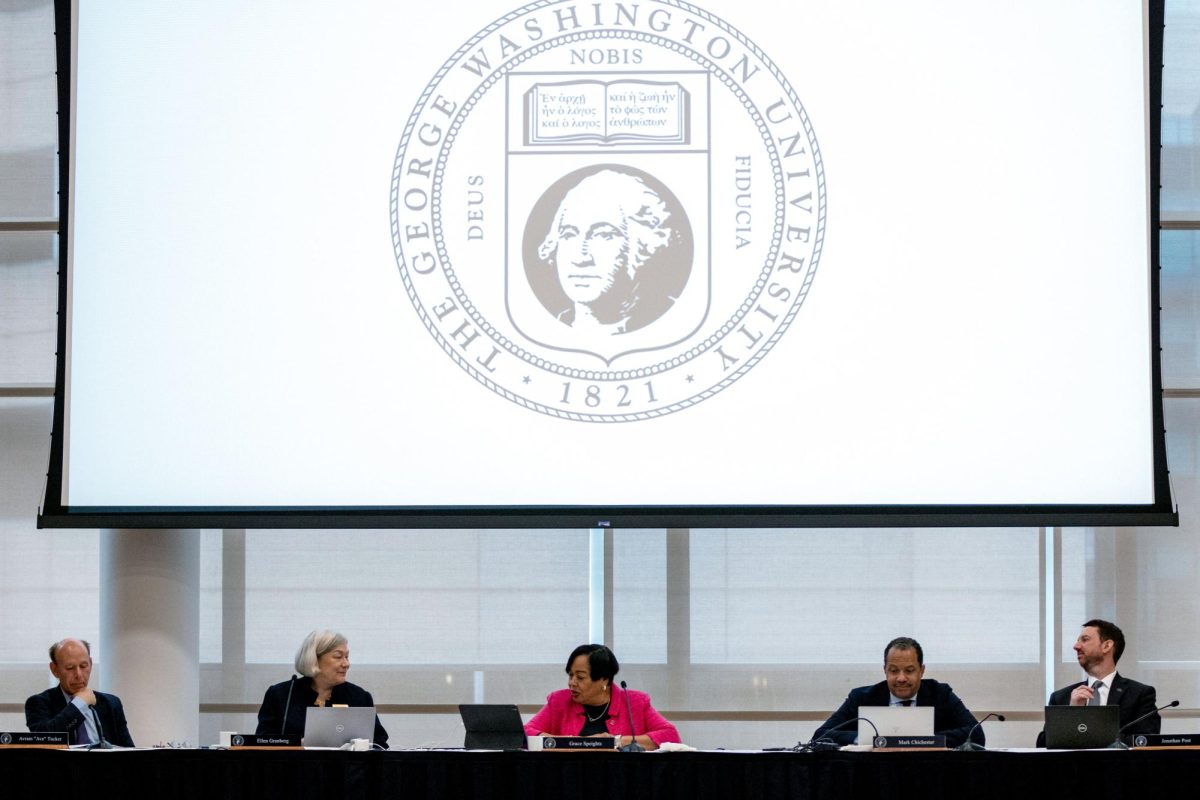Students will vote on a referendum in the Student Government Association election this week to weigh in on adding voting student members to the Board of Trustees.
The referendum serves only to gauge student opinion on whether the SGA president and vice president should hold full voting positions on the Board, not to approve any legislation or resolutions related to adding SGA leaders as voting Board members. SGA Sen. Ethan Fitzgerald (CCAS-U), who sponsored the referendum, said it would allow SGA leaders to present data to trustees on student body support for adding student members after the Board rejected a November SGA request for student representation.
“It’ll show the Board of Trustees, first of all, that this needs to be something that’s focused on more,” said Fitzgerald, an SGA presidential candidate. “Second of all, that this is something that students have broad consensus on.”
The Board is the highest form of government at the University — consisting of 22 trustees, 18 of whom are alumni — and possesses “full authority” over all University personnel and activities.
The Board decided last year to arm GW Police Department Officers — a move met with widespread derision from students and faculty. Students previously criticized the trustees’ refusal to cut financial ties with weapons manufacturers and its decision to not lower tuition costs while classes were online during the COVID-19 pandemic.
GW’s other forms of governance like the SGA and the Faculty Senate can pass resolutions to the Board, which essentially act as recommendations. The SGA president delivers a report at Board meetings and can serve as a “Board Observer” who attends all Board and committee meetings except for executive sessions.
The SGA has polled students twice before on whether the Board should add voting student members.
In response to a 2005 SGA election referendum, 70 percent of students answered “yes” when asked if there should be a student voting member on the Board. Students again voted overwhelmingly to add student voting positions in a 2020 referendum, with 93.7 percent approval.
Trustees denied the SGA’s request for student voting members in 2017 after trustees formed a task force that considered adding voting student positions. When previously rejecting student trustees in 2005, Board leadership pointed to its bylaws, which prohibit a student from serving as a trustee.
The Board can amend its bylaws with the vote of two-thirds of trustees, but the Board hasn’t amended its bylaws since 1978.
Fitzgerald said he’s having “initial” conversations with trustees and officials about student members. He said there “isn’t full reluctance” among officials for some form of increased student representation at the University.
“People recognize the need for more student perspective,” Fitzgerald said.
Fitzgerald has made the push to add student trustees central to his campaign. He said if elected, he would use his connections and the president’s regular sit-downs with administrators to continue conversations about student representation.
He would also use the president’s report at Board meetings to continue calling for student trustees, he said. Should Fitzgerald lose the presidential race, he said he would offer to support the new president in continuing to advocate for voting student trustees.
“In my very first report, if I were able to win, would say, ‘Hey, this is something I ran on,’” Fitzgerald said. “‘This is something that students voted for. I need you guys to consider this.’”
SGA President Arielle Geismar said she has pushed trustees to expand student representation since she was elected in May. She said she spent her first weeks in the role trying to lobby trustees to add a student voting member.
She said she learned in meetings that the Board will not have a student voting member unless they can add a faculty or staff member trustee. But GW’s congressional charter bans faculty and staff from joining because they have a conflict of interest with the University.
The charter states that an individual, except for the University president, cannot serve as a member of the Board while also serving as a GW officer, professor, lecturer, teacher, tutor or employee.
Geismar said she is working with the Board to create a group of 10 students that trustees would meet with quarterly so the Board can solicit student feedback on changes they would like to see at GW.
“Legally, the Board of Trustees has decided not to,” Geismar said. “But it doesn’t mean that we can’t find alternatives.”
Fitzgerald said the charter does not specify that students can’t serve on the Board. He said he has “qualms” with not adding student representation because faculty are prohibited from joining.
“Just because it’s hard to get both doesn’t mean we shouldn’t do one,” Fitzgerald said.





